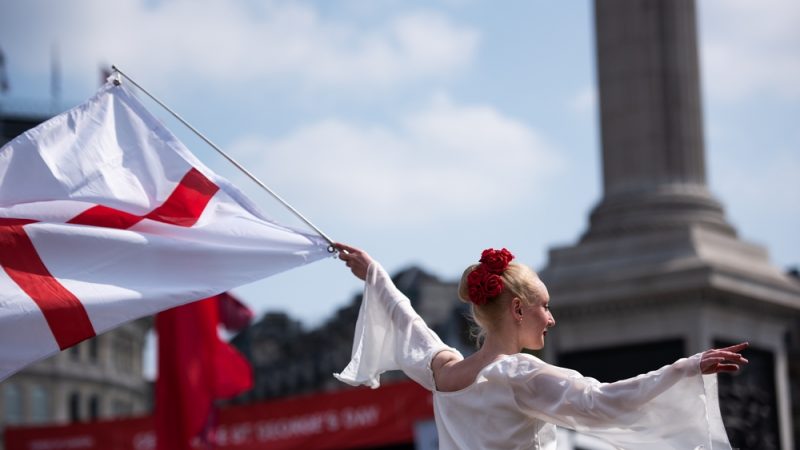
In a recent and quite bizarre argument, Russian-born ‘comic’ Kisin Konstantin declared that English-born Rishi Sunak wasn’t English because he was a ‘brown Hindu’. Most English people reject ethnic definitions of Englishness but the political arguments around identity shouldn’t be dismissed lightly.
The populist right is increasingly declaring that Britishness is inclusive, but Englishness is not. Their ‘Britishness’ is deeply conservative and defined by unqualified pride, of course – ‘our history’ as Kemi Badenoch calls it. Zia Yusuf, chair of Reform UK, calls himself a ‘patriotic British Muslim’. Suella Braverman weighed in on the side of Konstantin, not Sunak, her former party leader.
This is a political strategy. The populist right knows it can’t be a white exclusive party in a modern Britain where it needs votes from socially conservative Brits of all ethnicities. But it also wants voters who reject a diverse nation. Hence ‘inclusive Britishness’ but ‘exclusive (white) Englishness’. Labour dare not let the populist right define this debate. This means taking on the debate about Englishness and who can be English.
READ MORE: 50,000 back MP’s petition for a wealth tax to raise cash instead of welfare cuts
Labour usually ducks the question. We can’t any longer, and it’s about more than flags and football. Englishness does require some sense of England as a nation: as a physical and historic place with borders, boundaries, villages, towns and cities. England is part of Britain, but not the same as Britain. It has distinct political and social interests identified in opinion polls and, after all, domestic policy across the UK has been devolved for 25 years.
To be English carries a sense of English history: we have been shaped by, and have shaped, historical events. Englishness implies an understanding of who the people of England are. While most people in England say they are English and British, those who are most strongly English are the most patriotic about both identities. They are more likely to identify with a particular place in England.
Scroll to keep reading the story below….

READ MORE: ‘Politics has a problem with young women. I’ve seen it first hand’
All these ideas of England are contested, of course. That’s what the fight with the populist right is all about. Labour leaders usually choose only to talk about Britain (except on the occasional trip to Wales or Scotland). Much of the left is often uncertain on this terrain. Left activists often come from the 10-15% of the population which feels much less patriotic than the majority. Some think England and Britain are the same, despite history, geography, devolution and nationalist aspirations.
Some worry – correctly – about ideas of England as top nation that was always right, rather than an identity that intertwines the stories of everyone living here. Others fear that ‘the people’ means a fixed ethnic group or the people with ‘generational ties to English soil and ancestral stories tied to the towns or villages of this land’ as Braverman puts it. In truth, Englishness has historically incorporated newcomers who invest in their lives here. As we confront the populist right we can’t be spectators. Whose idea of England will win?
‘We can reject the appeal of the populist right but talk proudly of an England in tune with its people’
There’s a lot of progressive potential to build on. 90% think you don’t have to be white to be English (the same as for Britishness). 80% believe that being born here, like Sunak, entitles you to be English, which means that over time everyone of migrant origin gains an English birthright. Historians like David Olusoga have given us confidence to confront true history without culture wars.
Recent events have opened new arguments. The US turn against Europe and Ukraine, and the global economic chaos unleashed by Trump, have made Labour start talking about us as a nation that makes its own choices. The Southport riots and grooming gangs have disturbed our cohesive society, requiring a new national story. More nationalist economics and a new commitment to defence appeals to English (and British) ideas of patriotism while Labour’s aspirations to radically decentralise England can tap into deep local identities.
To take advantage, Keir Starmer’s government should clearly and directly take on the challenge of appealing to England, not just to Britain. We can clearly reject the racist appeal of the populist right, whether Tory or Reform, but talk proudly of an England that is in tune with most of its people.
The English Labour Network will host a discussion of Labour’s English identity in Westminster this afternoon at 5.15pm. Speakers include Foreign Secretary David Lammy, Margaret Mullane MP, Fred Thomas MP, Gareth Snell MP, PPI’s Claire Ainsley and British Future’s Sunder Katwala. Find more information and book tickets here.
For more from LabourList, subscribe to our daily newsletter roundup of all things Labour – and follow us on Bluesky, WhatsApp, Threads, X or Facebook .
- SHARE: If you have anything to share that we should be looking into or publishing about this story – or any other topic involving Labour– contact us (strictly anonymously if you wish) at [email protected].
- SUBSCRIBE: Sign up to LabourList’s morning email here for the best briefing on everything Labour, every weekday morning.
- DONATE: If you value our work, please chip in a few pounds a week and become one of our supporters, helping sustain and expand our coverage.
- PARTNER: If you or your organisation might be interested in partnering with us on sponsored events or projects, email [email protected].
- ADVERTISE: If your organisation would like to advertise or run sponsored pieces on LabourList‘s daily newsletter or website, contact our exclusive ad partners Total Politics at [email protected].




More from LabourList
‘Council Tax shouldn’t punish those who have the least or those we owe the most’
Two-thirds of Labour members say government has made too many policy U-turns, poll reveals
‘Two states, one future: five steps on the path to peace for Israelis and Palestinians’